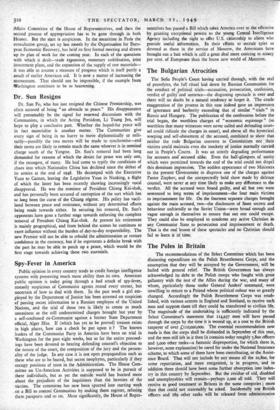The Bulgarian Atrocities
The Sofia People's Court having carried through, with the zeal of proselytes, the full ritual laid down by Russian Communists for the conduct of political trials—accusation, prosecution, confession, verdict of guilty' and sentence—the disgusting spectacle is over and there will no doubt be a natural tendency to forget it. The crude exaggeration of the process in this case indeed gave an impression of ignorance and barbarity exceeding that of similar " trials " in Russia and Hungary. The publication of the confessions before the trial began, the worthless charges of " economic espionage " (so worthless that many witnesses were never called and defending coun- sel could ridicule the charges in court), and above all the hysterical weeping and self-abasement of the accused, combined to show that neither the rude Bulgarian converts to Communism nor their victims could maintain even the mockery of justice normally carried out in People's Courts. It was an utterly degrading performance for accusers and accused alilrP Even the half-glimpses of sanity which were permitted towards the end of the trial could not dispel this dominant impression. The sudden appearance of two Ministers in the present Government to disprove one of the charges against Pastor Ziapkov, and the unexpectedly bold show made by defence counsel, were never at any time likely to make any difference to the verdict. All the accused were found guilty, and all but two were sentenced to long terms of imprisonment—the four main victims to imprisonment for life. On the fourteen separate charges brought against the main accused, two—the disclosures of State secrets and behaviour unfriendly to the Soviet• Union—were broad enough and vague enough in themselves to ensure that not one could escape. They could also be employed to condemn any active Christian in any Communist State to persecution and imprisonment or death. That is the real lesson of these spectacles and no Christian should fail to learn it in time.






































 Previous page
Previous page